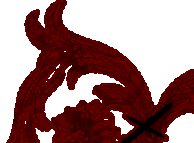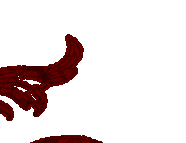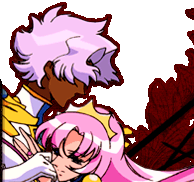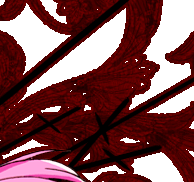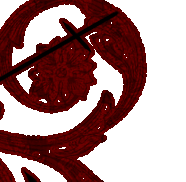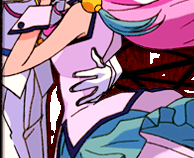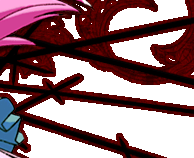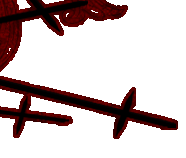
This analysis
was donated by Hugo Schmidt. 
One thing that is often commented on in comparisons of the Utena series and the Utena film is the glaring difference in character that may be seen in the two Tougas. Series-Touga is cold blooded, arrogant, manipulative to the point of outright cruelty, and not exactly a very nice person.
Film-Touga on the other hand is very much the idealized Prince, a romantic and honourable character who fits the mould of “prince” extremely well, much to the delight of the Touga fangirls, who are discussed elsewhere. The key to this dichotomy is the Touga in the original mangas by Chiho Saito.
What is very interesting is that this Touga appears to be about halfway between series- and film-Touga. On the one hand, he is characterised as an unbelievable playboy. On the other hand, he does manifest some extremely redeeming features, especially after being defeated by Utena in volume three. He resigns his position as Student Council President, declares Utena his master and honestly tries to serve and help her as honestly as possible, even if he does make it clear that if Utena ever does want a romp with him, she just needs to ask. The clearest evidence for this aspect of his character comes toward the conclusion of the series, when the characters enter the castle of Dios. While Miki, Jury and Saionji all attempt to escape – and are sealed in coffins for their cowardice – Touga stays, because he sees his role as protecting Utena. Finally, when the Revolution begins to occur, and the castle quakes, Touga saves Utena’s life, at the cost of having his legs crushed by falling rubble.
This isn’t the lesser wound he receives from Saionji, and is not done for that reason. It is perfectly clear that this is a moment of genuine heroism. In the end, when Anthy departs Ohtori academy to search for Utena, Touga is very much a changed man, and has abandoned his playboy side. This is the nature of manga-Touga. Now, this is, I believe, the key to understanding the differences in series-Touga and film-Touga. Series-Touga emphasises the dark side of manga-Touga while film-Touga emphasises quite the reverse. Also, the manga may explain the change in series-Touga in the Apocalypse-saga. In the manga, Touga chooses to redeem himself when he sees Utena receiving the power of Dios. He immediately changes his behaviour,
goes on one knee before Utena, not in a romantic manner, but in a way that suggests genuine subservience and respect, and announces his resignation. The key point here is that he has seen something much greater that makes his ambitions to date seem pointless, and he now has a new goal to aim for. Returning to the series, this is probably what happens to Touga when he is defeated by Utena, but in a different way. Prior to Utena, Touga was the unchallenged lord of the campus. Saionji’s attempts to rebel against his authority were a joke, and as student council president he controlled just about everything. In short, there was no more room for him to rise, and he was bored. Even his promiscuity was probably just a response top that. When he
first sets eyes on Utena, it is fairly obvious that she seems just another conquest for him. When he is defeated by her, it is devastating, because he has grown used to the idea of being supreme.
More importantly, this begins to show him that there are higher goals and things to reach. Now, here comes the divergence. While manga-Touga is inspired by Dios, series-Touga has another inspiration – Akio! This should be enough to explain the difference, but let’s explore it in more detail. When Touga emerges from his depression, he has realized that there is a greater world out there – and he is determined to reach it, to claim his part in it. This is mirrored in the film by the talk of the Outside World. Touga suddenly becomes the willing servant of Akio. What is his motivation? It is probably that he thinks that he can learn from Akio, and eventually become a Dark Prince in his own right.
Yes, I can hear the mockery of the Akio-fans.
It is irrelevant whether or not this is possible. What is important is that Touga believes this is possible. Notice the different roles that sex plays in their two lives. Sex for Touga is just a recreation – sex for Akio is a tool, a means to an end. Note again how Touga’s many lovers are from the normal ruck of students, while Akio’s are much “higher up” in importance: Anthy, Mrs. Ohtori and so on. Touga desires to raise his own predations to that level. An objection that might be raised is that he does seem to develop genuine affection for Utena. However, I think that this springs from the same source, his desire to be “something more”, regardless if it is good or evil. While Touga was living in the confined world of the rose saga, he couldn’t have felt affection for anyone. As he tries to become something more, he comes to admire and respect Utena and feel love for her. The two are interconnected. In a strange way, this is Touga growing up. He isn’t content with simple indulgence or meaningless games – he now wants real goals, true influence and the knowledge and ability to get them. His previous life seems to gall or at least bore him – witness the comment about how being a playboy seems so old-fashioned. He, in essence, wants some sort of meaning in his life – and – the only two people he thinks he can gain that from are, irony of ironies, Akio and Utena. Speaking personally for a moment, while I do not by any length consider series-Touga a nice guy, it is this attempt at “redemption” and his attempts to reach a “higher” state that I find very appealing. It may be a dark attempt at redemption, but it is an attempt nontheless.
  |

